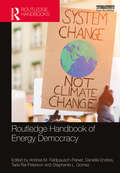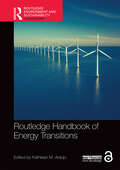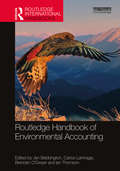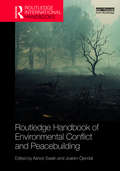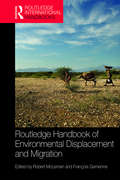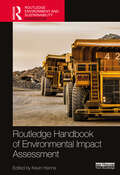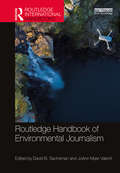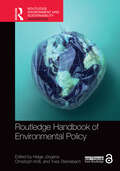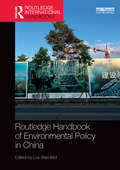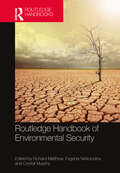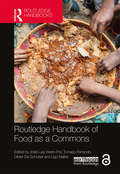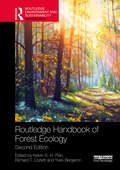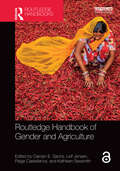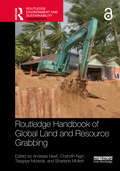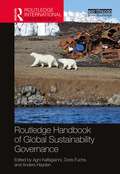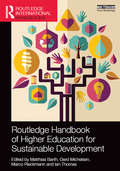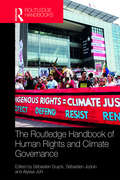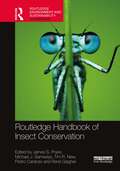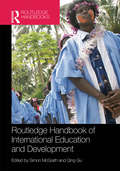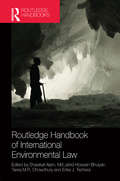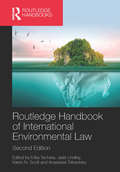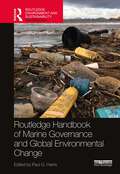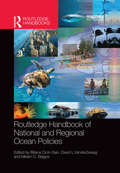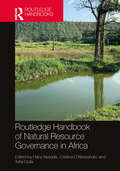- Table View
- List View
Routledge Handbook of Energy Democracy (Routledge International Handbooks)
by Tarla Rai Peterson Danielle Endres Andrea M. Feldpausch-Parker Stephanie L. GomezThis handbook offers a comprehensive transdisciplinary examination of the research and practices that constitute the emerging research agenda in energy democracy. With protests over fossil fuels and controversies over nuclear and renewable energy technologies, democratic ideals have contributed to an emerging social movement. Energy democracy captures this movement and addresses the issues of energy access, ownership, and participation at a time when there are expanding social, political, environmental, and economic demands on energy systems. This volume defines energy democracy as both a social movement and an academic area of study and examines it through a social science and humanities lens, explaining key concepts and reflecting state-of-the-art research. The collection is comprised of six parts: 1 Scalar Dimensions of Power and Governance in Energy Democracy 2 Discourses of Energy Democracy 3 Grassroots and Critical Modes of Action 4 Democratic and Participatory Principles 5 Energy Resource Tensions 6 Energy Democracies in Practice The vision of this handbook is explicitly transdisciplinary and global, including contributions from interdisciplinary international scholars and practitioners. The Routledge Handbook of Energy Democracy will be the premier source for all students and researchers interested in the field of energy, including policy, politics, transitions, access, justice, and public participation.
Routledge Handbook of Energy Transitions (Routledge Environment and Sustainability Handbooks)
by Kathleen M. AraújoThe Routledge Handbook of Energy Transitions draws upon a unique and multidisciplinary network of experts from around the world to explore the expanding field of energy transitions.This Handbook recognizes that considerable changes are underway or are being developed for the modes in which energy is sourced, delivered, and utilized. Employing a sociotechnical approach that accounts for economics and engineering, as well as more cross-cutting factors, including innovation, policy and planning, and management, the volume considers contemporary ideas and practices that characterize the field. The book explores pressing issues, including choices about infrastructure, the role of food systems and materials, sustainability, and energy democracy. Disruption is a core theme throughout, with the authors examining topics such as digitalization, extreme weather, and COVID-19, along with regional similarities and differences. Overall, the Routledge Handbook of Energy Transitions advances the field of energy transitions by connecting ideas, taking stock of empirical insights, and challenging how we think about the theory and practice of energy systems change.This innovative volume functions as an authoritative roadmap with both regional and global relevance. It will be an essential resource for students, policymakers, researchers, and practitioners researching and working in the fields of energy transitions, planning, environmental management and policy, sustainable business, engineering, science and technology studies, political science, geography, design anthropology, and environmental justice.“With the exception of Chapter 26, no part of this book may be reprinted or reproduced or utilised in any form or by any electronic, mechanical, or other means, now known or hereafter invented, including photocopying and recording, or in any information storage or retrieval system, without permission in writing from the publishers.” Chapter 26 of this book is freely available as a downloadable Open Access PDF at http://www.taylorfrancis.com under a Creative Commons [Attribution-Non Commercial-No Derivatives (CC-BY-NC-ND)] 4.0 license.
Routledge Handbook of Environmental Accounting (Routledge International Handbooks)
by Jan BebbingtonThis handbook showcases the broad spectrum of diverse approaches to environmental accounting which have developed during the last 30 years across the globe. The volume covers a range of physical issues such as water, carbon and biodiversity, as well as specific accounting matters such as management control, finance and audit. Moreover, seven chapters present environmental accounting issues that arise in the regions of Africa, Asia, Europe, MENA, North America, the Pacific and South America. The handbook also highlights future challenges in all the topic areas addressed as well as introducing new topics, such as links between environmental accounting and the circular economy, and the issues associated with animal rights. Edited by leading scholars in the area and with key contributions from across the discipline, and covering a diverse range of perspectives and locations, the volume is divided into five key parts: • Part 1: Framing the issues • Part 2: Financial accounting and reporting • Part 3: Management accounting • Part 4: Global and local perspectives • Part 5: Thematic topics in environmental accounting This handbook will act as a significant publication in drawing together the history of the field and important reference points in its future development, and will serve as a vital resource for students and scholars of environmental accounting and environmental economics.
Routledge Handbook of Environmental Conflict and Peacebuilding (Routledge International Handbooks)
by Joakim Öjendal Ashok SwainThe past two decades have witnessed the emergence of a large body of research examining the linkage between environmental scarcity, violent conflict, and cooperation. However, this environmental security polemic is still trying to deliver a well-defined approach to achieving peace. Studies are being undertaken to find the precise pathways by which cooperative actions are expected not only to pre-empt or moderate resource conflicts but also to help diffuse cooperative behaviour to other disputed issues. The recognition that environmental resources can contribute to violent conflict accentuates their potential significance as pathways for cooperation and the consolidation of peace in post-conflict societies. Conceived as a single and reliable reference source which will be a vital resource for students, researchers, and policy makers alike, the Routledge Handbook of Environmental Conflict and Peacebuilding presents a wide range of chapters written by key thinkers in the field, organised into four key parts: Part I: Review of the concept and theories; Part II: Review of thematic approaches (resources, scarcity, intervention, adaptation, and peacebuilding); Part III: Case studies (Middle East, Iraq, Jordan, Liberia, Nepal, Colombia, Philippines); Part IV: Analytical challenges and future-oriented perspectives. Enabling the reader to find a concise expert review on topics that are most likely to arise in the course of conducting research or policy making, this volume presents a truly global overview of the key issues and debates in environmental conflict and peacebuilding.
Routledge Handbook of Environmental Displacement and Migration (Routledge International Handbooks)
by Robert McLeman François GemenneThe last twenty years have seen a rapid increase in scholarly activity and publications dedicated to environmental migration and displacement, and the field has now reached a point in terms of profile, complexity, and sheer volume of reporting that a general review and assessment of existing knowledge and future research priorities is warranted. So far, such a product does not exist. The Routledge Handbook of Environmental Displacement and Migration provides a state-of-the-science review of research on how environmental variability and change influence current and future global migration patterns and, in some instances, trigger large-scale population displacements. Drawing together contributions from leading researchers in the field, this compendium will become a go-to guide for established and newly interested scholars, for government and policymaking entities, and for students and their instructors. It explains theoretical, conceptual, and empirical developments that have been made in recent years; describes their origins and connections to broader topics including migration research, development studies, and international public policy and law; and highlights emerging areas where new and/or additional research and reflection are warranted. The structure and the nature of the book allow the reader to quickly find a concise review relevant to conducting research or developing policy on particular topics, and to obtain a broad, reliable survey of what is presently known about the subject.
Routledge Handbook of Environmental Impact Assessment (Routledge Environment and Sustainability Handbooks)
by Kevin HannaGlobally, environmental impact assessment (EIA) is one of the most enduring and influential environmental management tools. This handbook provides readers with a strong foundation for understanding the practice of EIA, by outlining the different types of assessment while also providing a guide to best practice. This collection deploys a research and practice-based approach to the subject, delivering an overview of EIA as an essential and practical tool of environmental protection, planning, and policy. To best understand the most pertinent issues and challenges surrounding EIA today, this volume draws together prominent researchers, practitioners, and young scholars who share their work and knowledge to cover two key parts. The first part introduces EIA processes and best practices through analytical and critical chapters on the stages/elements of the EIA process and different components and forms of assessment. These provide examples that cover a wide range of assessment methods and cross-cutting issues, including cumulative effects assessment, social impact assessment, Indigenous-led assessment, risk assessment, climate change, and gender-based assessment. The second part provides jurisdictional reviews of the European Union, the US National Environmental Policy Act, recent assessment reforms in Canada, EIA in developing economies, and the EIA context in England. By providing a concise outline of the process followed by in-depth illustrations of approaches, methods and tools, and case studies, this book will be essential for students, scholars, and practitioners of environmental impact assessment.
Routledge Handbook of Environmental Journalism (Routledge International Handbooks)
by David B. Sachsman JoAnn Myer ValentiThe Routledge Handbook of Environmental Journalism provides a thorough understanding of environmental journalism around the world. An increasing number of media platforms – from newspapers and television to Internet social media networks – are the major providers of indispensable information about the natural world and environmental risk. Despite the dramatic changes in the news industry that have tended to reduce the number of full-time newspaper reporters, environmental journalists remain key to bringing stories to light across the globe. With contributions from around the world broken down into five key regions – the United States of America, Europe and Russia, Asia and Australia, Africa and the Middle East, and South America – this book provides support for today’s environment reporters, the providers of essential news in the 21st century. As a scholarly and journalistic work written by academics and the environmental reporters themselves, this volume is an essential text for students and scholars of environmental communication, journalism, and global environmental issues more generally, as well as professionals working in this vital area.
Routledge Handbook of Environmental Policy (Routledge Environment and Sustainability Handbooks)
by Helge Jörgens Christoph Knill Yves SteinebachThis Handbook provides a state-of-the-art review of research on environmental policy and governance. The Routledge Handbook of Environmental Policy has a strong focus on new problem structures – a perspective that emphasizes the preconditions and processes of environmental policymaking – and a comparative approach that covers all levels of local, national, and global policymaking. The volume examines the different conditions under which environmental policymaking takes place in different regions of the world and tracks the theoretical, conceptual, and empirical developments that have been made in recent years. It also highlights emerging areas where new and/or additional research and reflection are warranted. Divided into four key parts, the accessible structure and the nature of the contributions allow the reader to quickly find a concise expert review on topics that are most likely to arise in the course of conducting research or developing policy, and to obtain a broad, reliable survey of what is presently known about the subject. The resulting compendium is an essential resource for students, scholars, and policymakers working in this vital field.
Routledge Handbook of Environmental Policy in China (Routledge Environment and Sustainability Handbooks)
by Eva SternfeldDuring the last few decades, China has accomplished unprecedented economic growth and has emerged as the second largest economy in the world. This ‘economic miracle’ has led hundreds of millions of people out of poverty, but has also come at a high cost. Environmental degradation and the impact of environmental pollution on health are nowadays issues of the greatest concern for the Chinese public and the government. The Routledge Handbook of Environmental Policy in China focuses on the environmental challenges of China’s rapidly growing economy and provides a comprehensive overview of the policies developed to address the environmental crisis. Leading international scholars and practitioners examine China’s environmental governance efforts from an interdisciplinary perspective. Divided into five parts, the handbook covers the following key issues: Part I: Development of Environmental Policy in China - Actors and Institutions Part II: Key issues and Strategies for Solution Part III: Policy Instruments and Enforcement Part IV: Related Policy Fields – Conflicts and Synergies Part V: China’s Environmental Policy in the International Context This comprehensive handbook will be an invaluable resource to students and scholars of environmental policy and politics, development studies, Chinese studies, geography and international relations.
Routledge Handbook of Environmental Security
by Richard Matthew Evgenia Nizkorodov Crystal Murphy Kristen A. Goodrich Ashley Hooper Bemmy Maharramli Maureen J. Purcell Paroma WagleThe Routledge Handbook on Environmental Security provides a comprehensive, accessible, and sophisticated overview of the field of environmental security. The volume outlines the defining theories, major policy and programming interventions, and applied research surrounding the relationship between the natural environment and human and national security. Through the use of large-scale research and ground-level case analyses from across the globe, it details how environmental factors affect human security and contribute to the onset and continuation of violent conflict. It also examines the effects of violent conflict on the social and natural environment and the importance of environmental factors in conflict resolution and peacebuilding. Organized around the conflict cycle, the handbook is split into four thematic sections: • Section I: Environmental factors contributing to conflict; • Section II: The environment during conflict; • Section III: The role of the environment in post-conflict peacebuilding; and • Section IV: Cross-cutting themes and critical perspectives. This handbook will be essential reading for students of environmental studies, human security, global governance, development studies, and international relations in general.
Routledge Handbook of Food as a Commons
by Olivier De Schutter Ugo Mattei Jose Luis Vivero-Pol Tomaso FerrandoFrom the scientific and industrial revolution to the present day, food – an essential element of life – has been progressively transformed into a private, transnational, mono-dimensional commodity of mass consumption for a global market. But over the last decade there has been an increased recognition that this can be challenged and reconceptualized if food is regarded and enacted as a commons. This Handbook provides the first comprehensive review and synthesis of knowledge and new thinking on how food and food systems can be thought, interpreted and practiced around the old/new paradigms of commons and commoning. The overall aim is to investigate the multiple constraints that occur within and sustain the dominant food and nutrition regime and to explore how it can change when different elements of the current food systems are explored and re-imagined from a commons perspective. Chapters do not define the notion of commons but engage with different schools of thought: the economic approach, based on rivalry and excludability; the political approach, recognizing the plurality of social constructions and incorporating epistemologies from the South; the legal approach that describes three types of proprietary regimes (private, public and collective) and different layers of entitlement (bundles of rights); and the radical-activist approach that considers the commons as the most subversive, coherent and history-rooted alternative to the dominant neoliberal narrative. These schools have different and rather diverging epistemologies, vocabularies, ideological stances and policy proposals to deal with the construction of food systems, their governance, the distributive implications and the socio-ecological impact on Nature and Society. The book sparks the debate on food as a commons between and within disciplines, with particular attention to spaces of resistance (food sovereignty, de-growth, open knowledge, transition town, occupations, bottom-up social innovations) and organizational scales (local food, national policies, South–South collaborations, international governance and multi-national agreements). Overall, it shows the consequences of a shift to the alternative paradigm of food as a commons in terms of food, the planet and living beings.
Routledge Handbook of Forest Ecology (Routledge Environment and Sustainability Handbooks)
by Richard T. Corlett Yves Bergeron Pehm, Kelvin S.-H.The Routledge Handbook of Forest Ecology is an essential resource covering all aspects of forest ecology from a global perspective.This new edition has been fully revised and updated throughout to reflect the profound and unprecedented changes in both forests and climates since the publication of the first edition in 2015. The handbook reflects key developments in the field of forest dynamics and large-scale processes, as well as the changes that are now manifesting in different types of forests across the globe as a result of climate change. It covers both natural and managed forests, from boreal, temperate, sub-tropical and tropical regions of the world. In this second edition, the breadth of the handbook has been expanded with new chapters on mountain forests, monodominance, pathogens and invertebrate pests and amphibians and reptiles in forest ecosystems. Original author teams are complemented by the addition of new authors to offer fresh perspectives, and the second edition places greater emphasis on the applicability of each topic at a global level. The handbook is divided into seven parts:• Part I: The forest• Part II: Forest dynamics• Part III: Forest flora and fauna• Part IV: Energy and nutrients• Part V: Forest conservation and management• Part VI: Forest and climate change• Part VII: Human ecologyThe Routledge Handbook of Forest Ecology is an essential reference text for a wide range of students and scholars of ecology, environmental science, forestry, geography and natural resource management.
Routledge Handbook of Gender and Agriculture
by Carolyn E. Sachs, Leif Jensen, Paige Castellanos, and Kathleen SexsmithThe Routledge Handbook of Gender and Agriculture covers major theoretical issues as well as critical empirical shifts in gender and agriculture. Gender relations in agriculture are shifting in most regions of the world with changes in the structure of agriculture, the organization of production, international restructuring of value chains, climate change, the global pandemic, and national and multinational policy changes. This book provides a cutting-edge assessment of the field of gender and agriculture, with contributions from both leading scholars and up-and-coming academics as well as policymakers and practitioners. The handbook is organized into four parts: part 1, institutions, markets, and policies; part 2, land, labor, and agrarian transformations; part 3, knowledge, methods, and access to information; and part 4, farming people and identities. The last chapter is an epilogue from many of the contributors focusing on gender, agriculture, and shifting food systems during the coronavirus pandemic. The chapters address both historical subjects as well as ground-breaking work on gender and agriculture, which will help to chart the future of the field. The handbook has an international focus with contributions examining issues at both the global and local levels with contributors from across the world. With contributions from leading academics, policymakers, and practitioners, and with a global outlook, the Routledge Handbook of Gender and Agriculture is an essential reference volume for scholars, students, and practitioners interested in gender and agriculture.
Routledge Handbook of Gender and Water Governance (Routledge Environment and Sustainability Handbooks)
by Margreet Zwarteveen Tatiana Acevedo-Guerrero Lisa Bossenbroek Irene Leonardelli Seema KulkarniThis handbook provides a comprehensive overview of the field of gender and water governance, exploring how the use, management and knowledge of water resources, services and the water environment are deeply gendered.In water there is a recognized gender gap between water responsibilities and water rights and bridging this gap is likely to help achieve not just goals of equity but also those of sustainability. Building on a rich legacy of feminist water scholarship, the Routledge Handbook of Gender and Water Governance is a collection of reflections and studies that can be used as a prismatic lens into a thriving and ever proliferating array of feminist water studies. It provides a clear testimony of how hydrofeminism has evolved from rather instrumental gender and water studies to scholarship that uses feminist tools to pry open, critically reflect on and formulate alternatives to water development-as-usual. The book also shows how the community of feminists interested in studying water has diversified and expanded, from often white female scholars studying projects and gender relations in the so-called Global South, to a varied mix of scholars and activists theorizing from diverse geographical and political locations – prominently including the body. It is organized into five interconnected parts: Part I: Positionality and embodied waters Part II: Revisiting water debates: diplomacy, security, justice and heritage Part III: Sanitation stories Part IV: Precarious livelihoods Part V: New feminist futures Each of these parts brings out the gendered nature of water, shedding light on the often neglected care and unpaid labour of women and its relationship with extractivism and socioeconomic inequalities. The overall aim of the handbook is to apply social science insights to water governance challenges, creating synergies and linkages between different disciplines and scientific domains.The Routledge Handbook of Gender and Water Governance is essential reading for students, scholars and professionals interested in water governance, water security, health and sanitation, gender studies and sustainable development more broadly.
Routledge Handbook of Global Land and Resource Grabbing (Routledge Environment and Sustainability Handbooks)
by Sharlene Mollett Andreas Neef Chanrith Ngin Tsegaye MoredaThis handbook provides a cutting-edge, comprehensive overview of global land and resource grabbing. Global land and resource grabbing has become an increasingly prominent topic in academic circles, among development practitioners, human rights advocates, and in policy arenas. The Routledge Handbook of Global Land and Resource Grabbing sustains this intellectual momentum by advancing methodological, theoretical and empirical insights. It presents and discusses resource grabbing research in a holistic manner by addressing how the rush for land and other natural resources, including water, forests and minerals, is intertwined with agriculture, mining, tourism, energy, biodiversity conservation, climate change, carbon markets, and conflict. The handbook is truly global and interdisciplinary, with case studies from the Global South and Global North, and chapter contributions from practitioners, activists and academics, with emerging and Indigenous authors featuring strongly across the chapters. The handbook will be essential reading for students and scholars interested in land and resource grabbing, agrarian studies, development studies, critical human geography, global studies and natural resource governance.
Routledge Handbook of Global Sustainability Governance (Routledge International Handbooks)
by Anders Hayden Agni Kalfagianni Doris FuchsThe Routledge Handbook of Global Sustainability Governance provides a state-of-the-art review of core debates and contributions that offer a more normative, critical, and transformatively aspirational view on global sustainability governance. In this landmark text, an international group of acclaimed scholars provides an overview of key analytical and normative perspectives, material and ideational structural barriers to sustainability transformation, and transformative strategies. Drawing on pivotal new and contemporary research, the volume highlights aspects to be considered and blind spots to be avoided when trying to understand and implement global sustainability governance. In this context, the authors of this book debunk many myths about all-too optimistic accounts of progress towards a sustainability transition. Simultaneously, they suggest approaches that have the potential for real sustainability transformation and systemic change, while acknowledging existing hurdles. The wide-ranging chapters in the collection are organised into four key parts: • Part 1: Conceptual lenses • Part 2: Ethics, principles, and debates • Part 3: Key challenges • Part 4: Transformative approaches This handbook will serve as an important resource for academics and practitioners working in the fields of sustainability governance and environmental politics.
Routledge Handbook of Higher Education for Sustainable Development (Routledge International Handbooks)
by Ian Thomas Gerd Michelsen Matthias Barth Marco RieckmannThe Routledge International Handbook of Higher Education for Sustainable Development gives a systematic and comprehensive overview of existing and upcoming research approaches for higher education for sustainable development. It provides a unique resource for researchers engaged in the field of higher education for sustainable development by connecting theoretical aspects of the range of relevant methodologies, showing the interdisciplinary aspects of the research field and illustrating the breadth of research directions. With a team of international authors from leading universities in research and teaching in higher education for sustainable development this Handbook brings together a broad range of research approaches and shows how these approaches are reflected in the research practice in higher education for sustainable development. Key topics include: Research Paradigms and Methodologies Ongoing and Future Directions of Research Meta-Analysis and Reviews Policy and Politics Challenges for Implementation Action Research and Transdisciplinary Perspective Gender, Diversity and Post-Colonial Perspectives Operationalising Competencies Outcome-Oriented Research Curriculum Change Organisational Change and Organisational Learning Community and Partnerships University Appraisal Systems and Indicators Evaluation Approaches Engaging Academic Teachers Good Practice Learning and Teaching Transformative Leadership and Change Strategies This Handbook is an invaluable research and teaching tool for all those working in higher education for sustainable development.
Routledge Handbook of Human Rights and Climate Governance (Routledge International Handbooks)
by Sébastien Jodoin Sébastien Duyck Alyssa JohlOver the last decade, the world has increasingly grappled with the complex linkages emerging between efforts to combat climate change and to protect human rights around the world. The Paris Climate Agreement adopted in December 2015 recognized the necessity for governments to take into consideration their human rights obligations when taking climate action. However, important gaps remain in understanding how human rights can be used in practice to develop and implement effective and equitable solutions to climate change at multiple levels of governance. This book brings together leading scholars and practitioners to offer a timely and comprehensive analysis of the opportunities and challenges for integrating human rights in diverse areas and forms of global climate governance. The first half of the book explores how human rights principles and obligations can be used to reconceive climate governance and shape responses to particular aspects of climate change. The second half of the book identifies lessons in the integration of human rights in climate advocacy and governance and sets out future directions in this burgeoning domain. Featuring a diverse range of contributors and case studies, this Handbook will be an essential resource for students, scholars, practitioners and policy makers with an interest in climate law and governance, human rights and international environmental law.
Routledge Handbook of Insect Conservation (Routledge Environment and Sustainability Handbooks)
by Tim R. New James S. Pryke Michael J. Samways Pedro Cardoso René GaigherThis handbook presents a comprehensive overview of insect conservation and provides practical solutions to counteract insect declines, at a time where insects are facing serious threats across the world from habitat destruction to invasive species and climate change.The Routledge Handbook of Insect Conservation consist of six sections, covering all aspects of insect conservation, containing contributions from academics, researchers and practitioners from across the globe. Section I addresses the fundamentals of insect conservation and outlines the reason why insects are important and discusses the greatest drivers of insect decline. The chapters in Section II examine the approaches that can be used for insect conservation globally, such as protected areas and agroecology, while highlighting the importance of insects in the composition and function of ecosystems. The chapters in Section III focus on insect populations in the major biomes around the world, from temperate and tropical forests to savannas and grasslands, with the chapters in Section IV focusing on natural and manmade ecosystems of the world, including mountain, soil, urban, island and agricultural habitats. They discuss the unique pressures and challenges for each biome and ecosystem and offer practical solutions for conserving their insect populations. Section V focuses on the assessment and monitoring of insects for conservation, discussing how we can implement practical monitoring protocols and what options are available. A wide variety of methods and tools are examined, including citizen science, bioindication, the role of taxonomy, drones and eDNA. The book concludes by examining policy and education strategies for insect conservation in Section VI. The chapters discuss key issues around social and policy strategies and conservation legislation for ensuring the long-term protection of insects.This book is essential reading for students and scholars of biodiversity conservation and entomology as well as professionals and policymakers involved in conservation looking for real-world solutions to the threats facing insects across the globe.
Routledge Handbook of International Education and Development (Routledge International Handbooks)
by Simon McGrath & Qing GuThis timely Handbook takes stock of the range of debates that characterise the field of international education and development, and suggests key aspects of a research agenda for the next period. It is deliberately divergent in its approach, recognising the major ideological and epistemological divides that characterise a field that draws on many traditions. Leading and emergent voices from different paradigms and contexts are afforded a space to be heard and each section puts current debates in larger historical contexts. The Handbook is divided in four parts and book-ended by an introduction and a conclusion, the latter oriented towards the implications that the volume has for future research agendas. The first part explores major strands of debates about education’s place in development theory. The second acknowledges the disciplining of the field by the education for all movement and examines the place that learning and teaching, and schools play in development. Part three looks beyond schools to consider early years, adult and vocational education but focuses particularly on the return to thinking about higher education's role in development. The final part considers the changing, but still important, role that international cooperation plays in shaping education in developing countries. Featuring over thirty chapters written by leading international and interdisciplinary scholars, the Routledge Handbook of International Education and Development offers the first comprehensive and forward-looking resource for students and scholars.
Routledge Handbook of International Environmental Law
by Shawkat Alam Erika J. Techera Md Jahid Hossain Bhuiyan Tareq M.R. ChowdhuryThe Routledge Handbook of International Environmental Law is an advanced level reference guide which provides a comprehensive and contemporary overview of the corpus of international environmental law (IEL). The Handbook features specially commissioned papers by leading experts in the field of international environmental law, drawn from a range of both developed and developing countries in order to put forward a truly global approach to the subject. Furthermore, it addresses emerging and cross-cutting issues of critical importance for the years ahead. The book is split into six parts for ease of reference: The Legal Framework, Theories and Principles of International Environmental Law - focuses on the origins, theory, principles and development of the discipline; Implementing International Environmental Law - addresses the implementation of IEL and the role of various actors and institutions, including corporations, intergovernmental organisations and NGOs; Key Issues and Legal Frameworks - brings fresh perspectives of the common general issues of international environmental law, such as biological diversity and marine environmental law; Regional Environmental Law - explores the specific regimes developed to address regional environmental issues, considering the evolution, prospects and relationship of regional law and mechanisms to IEL; Cross-Cutting Issues - considers the engagement of international environmental law with other key fields and legal regimes, including international trade, human rights and armed conflict; Contemporary and Future Challenges - analyses pressing current and emerging issues in the field including environmental refugees and climate change, REDD and deforestation, and ‘treaty congestion’ in IEL. This up-to-date and authoritative book makes it an essential reference work for students, scholars and practitioners working in the field.
Routledge Handbook of International Environmental Law
by Erika Techera; Jade Lindley; Karen N. Scott; Anastasia TelesetskyThis book critically explores the legal tools, concepts, principles and instruments, as well as cross-cutting issues, that comprise the field of international environmental law. Commencing with foundational elements, progressing on to discrete sub-fields, then exploring regional cooperative approaches, cross-cutting issues and finally emerging challenges for international environmental law, it features chapters by leading experts in the field of international environmental law, drawn from a range of countries in order to put forward a truly global approach to the subject. The book is split into five parts: • The foundations of international environmental law covering the principles of international environmental law, standards and voluntary commitments, sustainable development, issues of public participation and environmental rights and compliance, state responsibility, liability and dispute settlement. • The key instruments and governance arrangements across the most critical areas of international environmental law: biodiversity, wildlife, freshwater, forestry and soils, fisheries, marine pollution, chemicals and waste, air and atmospheric pollution and climate change. • Crucial developments in seven distinct regions of the world: Africa, Europe, North America, Latin America, South East Asia, the polar regions and small island states. • Cross-cutting issues and multidisciplinary developments, drawing from multiple other fields of law and beyond to address human rights and Indigenous rights, war and armed conflict, trade, financing, investment, criminology, technology and energy. • Contemporary challenges and the emerging international environmental law regimes which address these: the changing climate, forced migration, marine plastic debris and future directions in international environmental law. Containing chapters on the most critical developments in environmental law in recent years, this comprehensive and authoritative book makes for an essential reference work for students, scholars and practitioners working in the field.
Routledge Handbook of Marine Governance and Global Environmental Change (Routledge Environment and Sustainability Handbooks)
by Paul G. HarrisThis comprehensive handbook provides a detailed and unique overview of current thinking about marine governance in the context of global environmental change. Many of the most profound impacts of global environmental change, and climate change in particular, will occur in the oceans. It is vital that we consider the role of marine governance in adapting to and mitigating these impacts. This comprehensive handbook provides a thorough review of current thinking about marine environmental governance, including law and policy, in the context of global environmental change. Initial chapters describe international law, regimes, and leadership in marine environmental governance, in the process considering how existing regimes for climate change and the oceans should and can be coordinated. This is followed by an exploration of the role of non-state actors, including scientists, nongovernmental organisations, and corporations. The next section includes a collection of chapters highlighting governance schemes in a variety of marine environments and regions, including coastlines, islands, coral reefs, the open ocean, and regional seas. Subsequent chapters examine emerging issues in marine governance, including plastic pollution, maritime transport, sustainable development, environmental justice, and human rights. Providing a definitive overview, the Routledge Handbook of Marine Governance and Global Environmental Change is suitable for advanced students in marine and environmental governance, environmental law and policy, and climate change, as well as practitioners, activists, stakeholders, and others concerned about the world’s oceans and seas.
Routledge Handbook of National and Regional Ocean Policies (Routledge Environment and Sustainability Handbooks)
by Biliana Cicin-Sain, David L. VanderZwaag, and Miriam C. BalgosThis comprehensive handbook, prepared by leading ocean policy academics and practitioners from around the world, presents in-depth analyses of the experiences of fifteen developed and developing nations and four key regions of the world that have taken concrete steps toward cross-cutting and integrated national and regional ocean policy. All chapters follow a common framework for policy analysis. While most coastal nations of the world already have a variety of sectoral policies in place to manage different uses of the ocean (such as shipping, fishing, oil and gas development), in the last two decades, the coastal nations covered in the book have undertaken concerted efforts to articulate and implement an integrated, ecosystem-based vision for the governance of ocean areas under their jurisdiction. This includes goals and procedures to harmonize existing uses and laws, to foster sustainable development of ocean areas, to protect biodiversity and vulnerable resources and ecosystems, and to coordinate the actions of the many government agencies that are typically involved in oceans affairs. The book highlights the serious conflicts of use in most national ocean zones and the varying attempts by nations to follow the prescriptions emanating from the 1982 UN Law of the Sea Convention and the outcomes of the 1992, 2002, and 2012 sustainable development summits. The interrelationship among uses and processes in the coast and ocean requires that ocean governance be integrated, precautionary, and anticipatory. Overall, the book provides a definitive state-of-the-art review and analysis of national and regional ocean policies around the world.
Routledge Handbook of Natural Resource Governance in Africa
by Hany Besada, Cristina D’Alessandro and Tefsi GollaThe Routledge Handbook of Natural Resource Governance in Africa provides a comprehensive analysis of African natural resource governance, stretching across the continent, and encompassing water, land, extractive resources, and mining.Africa’s natural resources are not only crucial for the continent from an economic, environmental, and political perspective, but they are also of significant geopolitical importance, with direct implication for meeting the global challenges outlined in the Sustainable Development Goals. Whether an abundance of natural resources proves to be a curse or a blessing depends on the nature, extent, and outcome of the effort and experience of an individual country in governing and managing such assets. It is with this in mind that this ground-breaking handbook brings together experts from across the field of natural resource development to reflect on the varied regime types and paradigms within the continent’s natural resource sectors, the specific challenges they face, and their role within global value chains. The book first considers governance for sustainable development and discourses of land and development financing, before going on to investigate the regulatory and policy impacts, and socioeconomic implications of natural resource management. Finally, the Handbook situates the African continent within the emerging global energy transition; examining trends in South-South cooperation, and new frontiers for the harnessing of critical tools in a sustainable future for natural resource governance and management.Overall, the Handbook’s in-depth analysis provides a unique blend of realism and optimism, highlighting the importance of building a new sustainable African resource narrative for shared prosperity. The handbook will be an essential read for researchers and policy makers with an interest in sustainable development and natural resource governance in Africa.
